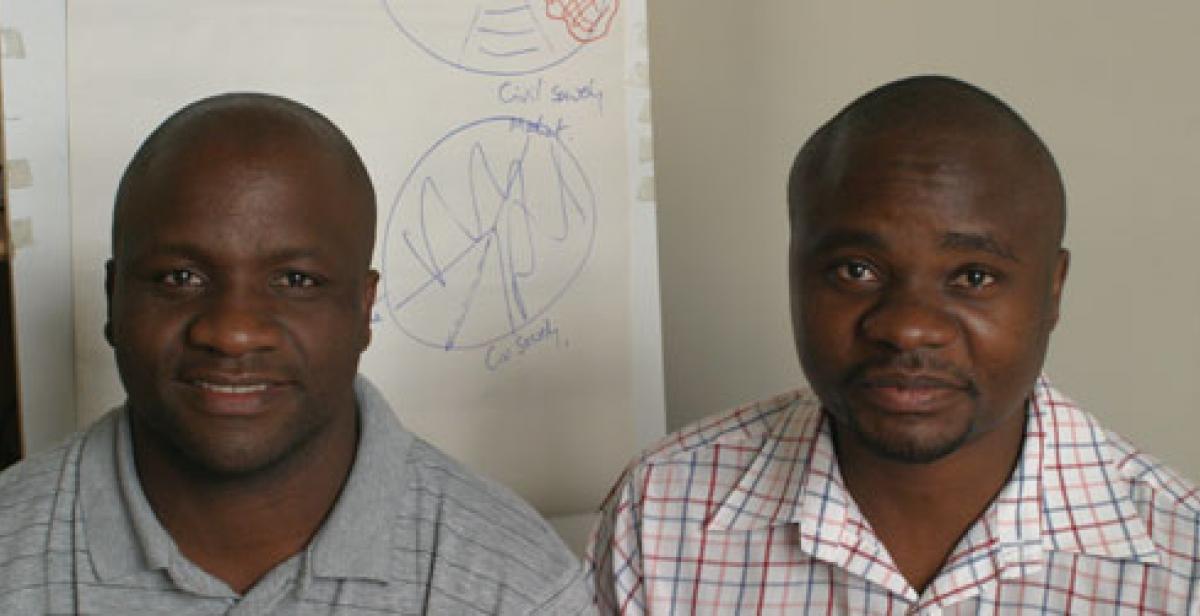How do you give ordinary men and women a voice in the elitist process of policy-making? A project supported by Progressio in Zimbabwe aims to do just that. Our development worker Christopher Mweembe (above left) and Machinda Marongwe (above right), from partner organisation NANGO, tell us more…
How did this project come about?
Chris: NANGO (the National Association of Non-Governmental Organisations) saw that policies in Zimbabwe were crafted from an elite level, with too much of a political agenda. The majority of the people were not involved in the development of policies – so those policies did not represent the poor.
So NANGO approached Progressio Zimbabwe and the Institute of Development Studies (IDS) at the University of Zimbabwe to come together to research and produce policy options that can be used by civil society organisations for advocacy in Zimbabwe.
Who was consulted during the research?
Machinda: It covered three levels. First, we engaged grassroots organisations in areas outside the main metropolitan areas. We wanted to get the ideas, understanding, beliefs, desperations of ordinary people into policy-making. Second, leaders at local level – councillors, mayors. And third, key stakeholders – so in the case of the diaspora report, we worked through diaspora organisations, for example in South Africa and the UK.
How did you actually get the views of the ‘grassroots’?
Machinda: NANGO has regional offices and a membership of 1,000 NGOs. So we coordinated the project through our regional structures. We brought grassroots organisations together for focus group discussions run by researchers from IDS, and used questionnaires and other tools to acquire the necessary data.
What was Chris’s role as a Progressio development worker?
Chris: My role was to build the capacity of NANGO and its member organisations to engage in advocacy on policy issues – to help NANGO develop strategies for engaging with policy-makers on policy issues.
Machinda: Policy-making is an elitist process and it was important in this project that the process was led and run by the people and communities who are going to benefit. At NANGO we had no clue about how to do this.
Chris came up with the mechanism that is pro-poor. He set up working committees made up of key interest groups – such as youth groups for our first paper, ‘A Critical Review of the National Youth Service Programme in Zimbabwe’. They discuss the key areas to be covered, draw up the terms of reference, coordinate the process. Essentially, Chris gave the technical support to ordinary men and women to create that space, and gave them the capacity to engage in what is a highly technical process.
In the past at NANGO we would have just engaged a consultant on a project like this. This project represents a paradigm shift because for the first time our members are doing it themselves – owning the process, doing the advocacy – not employing someone else to do it.
How would you describe your relationship with Progressio on this project?
Machinda: It’s a functional partnership. It’s not development that is done from the outside but instead it’s responsive to the issues that are taking place in the country. The topics and the policy papers are not dictated or pre-defined – they are driven by the members. Chris gave us the technical capacity to develop the programme, but it is owned by NANGO and it’s important in the ongoing policy debate for it to have that credibility.
The first report was on the Youth Service – how did that go?
Chris: When we published our report, we sent 10 copies to the Ministry of Youth. They soon asked for another 50 copies for each of their staff. Then they asked for another 200 to distribute to Ministers and MPs. During the cabinet meeting, the ministers deliberated on the resuscitation of the National Youth Service Programme in Zimbabwe. The report influenced a key decision on the future of the Youth Service that was going through Parliament at that time.
What are the key points of the new report on ‘Harnessing the diaspora potential’?
Chris: It’s about the challenges diaspora communities face in trying to participate in the socio-economic development of the country. The report identifies areas and opportunities for participation and contains recommendations by people both in the country and outside.
Machinda: For example, there’s a lack of a clear framework from government that will make it easy for the diaspora to invest. Many of those who left Zimbabwe are demonised as enemies of the state. They have interests to invest, but don’t know who to approach in the government. Meanwhile the government has no clear policy or position – there is in-fighting for control of links with the diaspora, so they end up taking a political rather than an economic position.
The launch of the report was attended by the Minister of Regional Integration and International Cooperation, the Hon Priscilla Misiharambwi-Mushonga. What did she think?
Machinda: She was saying that the report has some very helpful insights and we need to promote the findings to ministers. Chris and I are now in London to promote the democratic platforms within the diaspora so that ordinary Zimbabweans can be involved in discussions on these critical processes and issues.
What’s next for the project?
Chris: We’re looking at three key governance themes: participation of communities in the mining sector; the role of local government in HIV and health-related issues; and gender parity within agrarian reform. We want to critically review whether women benefited from the land reform programme and how women participate in the agricultural sector.
We’re also going to be training civil society organisations on how they can use these policy monographs for policy advocacy. This project gives ordinary people a voice – and empowers them to use it.
The project ‘Towards a New Zimbabwe: Sharing Skills for Dialogue for Pro-Poor Policies’ is funded by the European Commission.



